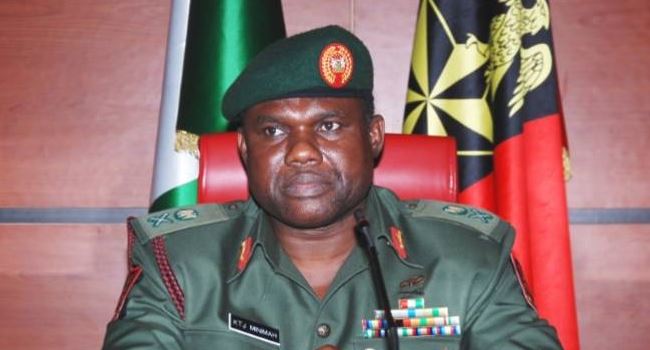
The Federal High Court sitting in Abuja, has temporarily halted the planned trial of former Chief of Army Staff, Lt. Gen. Kenneth Minimah and two other Generals accused of diverting about N13billion meant for procurement of arms.
The court, in an ex-parte order that was issued by Justice Inyang Ekwo, ordered the Economic and Financial Crimes Commission, EFCC, to stay action on the matter, pending the determination of a suit the Defendants filed to challenge their trial.
“The legal advice on the investigation opined that a prima facie case has been sustained against the Officers”, EFCC added.
It said the outcome of the investigation led to the filing of charges against the three officers fingered in the alleged fraud.
Consequently, EFCC, said it wrote the Nigerian Army, requesting the three officers to make themselves available for arraignment it said would have taken place since September 15, 2020.
However, the three Defendants, through their team of lawyers led by Mr. Mahmud Magaji, SAN, went to court to challenge their planned trial by the EFCC.
They specifically prayed are the court to among other things, determine;
“Whether in view of Sections 6(3), (5) (a), 240 and 318 of the Constitution of the Federal Republic of Nigeria, 1999 (as amended), and Sections 113, 114 (1), (2) 8(3), 123, 124, 126(1), (2) 8. (4) and 270 of the Armed Forces Act, Cap A20 laws of the Federation of Nigeria, 2004, the Plaintiffs are not subject to be charged arraigned and /or prosecuted only by a Court Martial as a Court of first instance, to the exclusion of any other trial Court, viz: the Federal High Court, High Court of the Federal Capital Territory, and High Court of States, in respect of any offence committed by them.
“Whether in view of Section 270 of the Armed Forces Act, Cap A20, laws of the Federation of Nigeria, 2004, the Economic and Financial Crimes Commission (the 2nd Defendant) or any other prosecuting agency can Iawfully investigate, charge, arraign and/or prosecute the Plaintiffs.
“Whether by virtue of Sections 123, 124(1) 8(3) and 126(1), (2) 8. (4) of the Armed Forces Act, Cap A20, laws of the Federation of Nigeria, 2004, the Plaintiffs are not to be reported in the form of a charge to their commanding officer after the investigation of any allegation against them.
“Whether in view of Sections 113, 114 (1), (2) 8(3), 124(3), and 126(1), (2) and (4) of the Armed Forces Act, Cap A20 Laws of the Federation of Nigeria, 2004, the Plaintiffs can validly be charged arraigned and/or prosecuted under any other law other than the Arm Forces Act, Cap.A20, Laws of the Federation of Nigeria, 2004.
“Whether by virtue of Sections 6(3) 8(5) (a) 240 and 318 of the Constitution of the Federal Republic of Nigeria, 1999 (as amended) and Section 129 of the Armed Forces Act, Cap A20, laws of the Federation of Nigeria, 2004, the Plaintiffs are not subjected to Court Martial in respect of offences (if any) committed by them”.
As well as, “Whether in view of Sections 113, 114 (1), (2) 8. (3), 123, 124, 126(1), (2) 8(4) and 270 of the Armed Forces Act, Cap A20 laws of the Federation of Nigeria, 2004, any Court other than Court Martial can entertain any charge against any of the Plaintiffs”.
They applied for an order, restraining the EFCC and other Defendants in their suit, “whether by themselves, agents, privies, servants, or howsoever called from investigating, charging, arraigning and or prosecuting the Plaintiffs for any allege offences or misconduct while subject to the Nigerian Armed Forces Service Law”.
Cited as Defendants in the suit are the Attorney-General of the Federation and Minister of Justice, and the EFCC
In an affidavit that was deposed to by one Benjamin Anchi, the Plaintiffs, said they were not allowed to explain their side of the story, before EFCC rushed the matter to the court.
Insisting that they are still subject to service law (the Armed Forces Act), the Plaintiffs, argued that, “if any military officer under the service law of the Nigerian Army commit an offence, it is reported in form of a charge to the commanding officer of the accused person for investigation and trial if necessary.
The Plaintiffs contended that EFCC does not have powers to arraign them “with respect to offences allegedly committed in the course of their official duties”, insisting that the charge against them “is unknown to law”.
Meantime, at the resumed proceedings on the matter on December 8, counsel to the Plaintiffs, Magaji, SAN, notified the court that all the parties have filed their pleadings.
Lawyers to the AGF and the EFCC, Habiba Chime and Sylvanus Tahir, also confirmed the development.
Consequently, Justice Ekwo adjourned the matter till January 14, 2022, stressing that the order directing parties to maintain status quo still subsists.
Comments